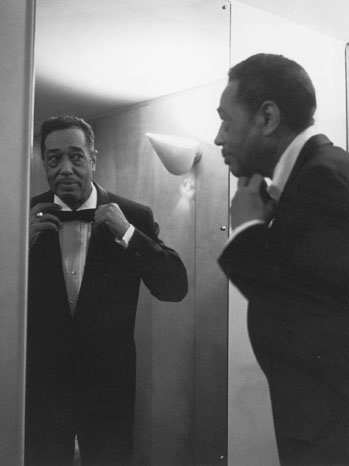Gotham Books sent me the “first-pass pages” of Duke: A Life of Duke Ellington yesterday afternoon. Translated into English, that means a two-inch stack of photocopied pages containing the typeset text of Duke, fully designed and copyedited but as yet uncorrected by me. You may have heard these pages referred to as “page proofs,” a term that I’m still in the habit of using.
 No matter how many books you’ve seen through the press, you always feel a surge of excitement when you get your first look at a set of your own page proofs. (I actually got weak in the knees when I opened the envelope.) Until that moment, you don’t know what the text of your book will look like to the people who read it. Then, in an instant, it becomes real–and fresh.
No matter how many books you’ve seen through the press, you always feel a surge of excitement when you get your first look at a set of your own page proofs. (I actually got weak in the knees when I opened the envelope.) Until that moment, you don’t know what the text of your book will look like to the people who read it. Then, in an instant, it becomes real–and fresh.
In my case, I spent so much time painstakingly editing and polishing the manuscript of Duke that it eventually went dead on me: I could still follow the text sentence by sentence, but I lost my ability to hear how it sounded. Now that the book is finally set in type, it’s come back to life again.
I stayed up late last night reading the page proofs of Duke, and I liked what I read. Needless to say, it helped that they look so good–Elke Sigal’s typographical design is flat-out gorgeous, and I’m no less happy with the illustrations–but I’ll admit to being equally pleased with the text, at least for now.
To be sure, I doubt that Ellington himself would have cared for the book. He was far too secretive to appreciate a biography that told the truth about his complicated life. As I wrote in the prologue to Duke:
The rage, the humiliation, the unbridled sensuality: All were kept far from prying eyes. His fans saw only what he wished them to see, and nothing more. So did his colleagues. “I think all the musicians should get together one certain day and get down on their knees and thank Duke,” said Miles Davis. Yet to Ellington’s own musicians, he was a riddle without an answer, an unknowable man who hid behind a high wall of ornate utterances and flowery compliments that grew higher as he grew older.
Still, I like to think that Ellington might at least have appreciated the fact that I took his life and work with the utmost seriousness, and tried to write about them in a way that mirrors, however dimly, the beauty of his music.
Can I make Duke even better? Maybe–but not for long. I have two weeks to make my final corrections to the text. After that, I’m done. It’s time.
UPDATE: I started correcting the page proofs this afternoon, and the first thing I saw was a mixed metaphor…on the third page. It’s going to be a long day.
